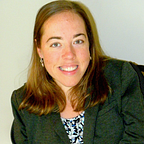What I Wish I’d Known About Disability When I Was Younger
It wasn’t until 10 years ago that I fully embraced my identity as a disabled woman.
 I was born with arthrogryposis, a physical disability that affects my muscles and joints. I have used a power wheelchair since I was 3 years old, and I have limited use of my arms and legs.
I was born with arthrogryposis, a physical disability that affects my muscles and joints. I have used a power wheelchair since I was 3 years old, and I have limited use of my arms and legs.
But though I’ve had a disability my entire life, I didn’t identify as “disabled” until my twenties.
Growing up, family and friends would tell me I wasn’t disabled — I was just different. Some would refer to me as “differently abled”; others would tell me I was “physically challenged.” My “favorite” euphemism, by far, was “handicapable.”
To be fair, I know my family and friends, who have always been supportive, never meant to offend me — and, at the time, their words didn’t hurt me (or at least not that I was consciously aware of).
Then, during middle school, I was introduced to an entirely different way to frame my disability: person-first language. Person-first language emerged in response to society’s history of discriminating against the disability community, with the aim of emphasizing that the individual is a person who just happens to have a disability. In other words, I was a person with a disability, rather than…
